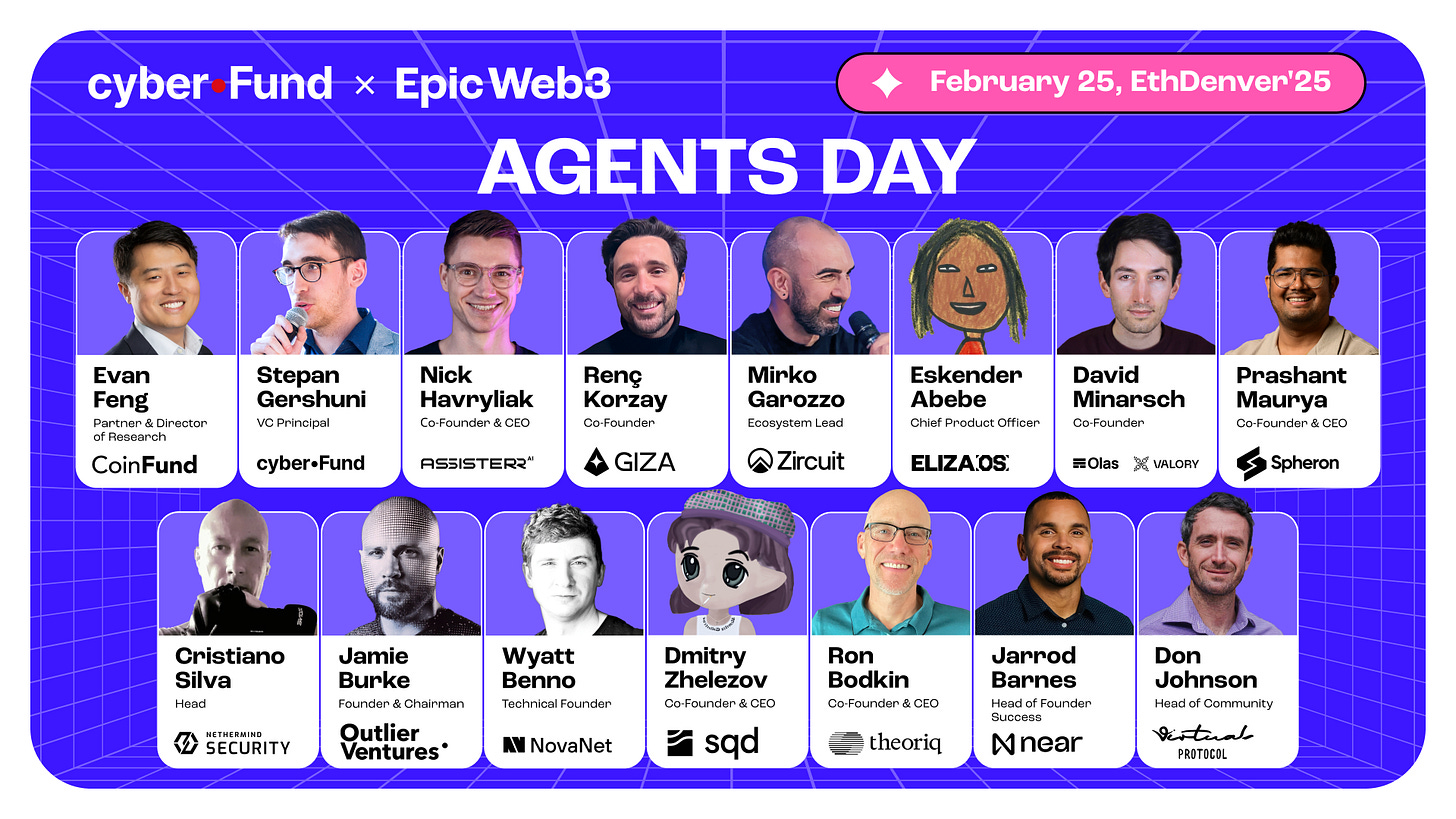AI Agents Revolution: From Hype to Real-World Impact 🤖
Mark your calendars for February 25th – we're hosting the biggest AI Agents side event at ETHDenver!
AI agents are evolving beyond simple automation, reshaping onchain coordination, financial infrastructure, and more. At Agents Day, we’ll focus on what’s working in the space: real-world use cases, technical challenges, and where AI agents fit into Web3’s future.
Let's explore why AI agents are causing such a stir in the Web3 ecosystem and what practical developments you should know about.
The biggest AI Agents side event at ETHDenver! 🧞♂️🤖
In a week we’ll explore autonomous systems, agent infrastructure, secure AI x Crypto integrations, data privacy, and more.
Speakers from cyber•Fund, ElizaOS, CoinFund, Virtuals, Outlier Ventures, Solana, Giza, Assisterr, NEAR, Zircuit, Spheron, Nethermind, NovaNet, Subsquid, Theoriq, and others!
🧠 The Emergence of Agent Economies
At first, AI in Web3 was mostly about meme coins. Now, it's shifting to real use cases – AI agents that trade, secure smart contracts, and automate onchain tasks.
These agents help with risk management, resource allocation, and decision-making in DeFi, governance, and security.
Platforms like Virtuals have introduced modular AI agent ecosystems utilizing ERC-6551, enabling agents to autonomously manage crypto wallets, generate multimedia content, and maintain long-term memory. These agents can autonomously analyze data, execute onchain transactions, and optimize interactions within decentralized ecosystems, moving beyond the speculative nature of meme-coins.
According to Messari's recent report, agent-controlled wallets have grown 300% over six months. The impact is particularly significant for DAOs, where operational costs have dropped by 40% through automated governance mechanisms.
This progression from speculation to function is reflected in transaction data. Cointelegraph's analysis shows that agent-initiated transactions now account for 18% of all DeFi volume - demonstrating real-world adoption beyond the initial hype cycle.
🛡️ AI Revolutionizing Smart Contract Security
The integration of AI in smart contract audits has gone from experimental to essential. AI-driven tools have become integral in auditing processes, autonomously scanning contracts for vulnerabilities, optimizing code efficiency, and ensuring compliance with established protocols.
Companies like CertiK have pioneered AI-powered security insights, offering real-time monitoring tools such as Skynet, which continuously scans smart contracts for potential exploits.
This approach speeds up the audit process and makes detecting vulnerabilities more accurate. This helps reduce the risk of attacks and builds more trust in decentralized apps.
This shift has slashed auditing times while boosting accuracy, as detailed in TechBullion's recent coverage. For developers, this means faster deployment cycles with enhanced security guarantees.
🌐 Multi-Agent Systems: Coordinated Intelligence in Action
The development of multi-agent systems follows a logical progression:
Single-Purpose Agents: Initial implementations focused on discrete tasks
Agent Collaboration: Frameworks enabling specialized agents to work together
Emergent Capabilities: Complex operations that exceed single-agent limitations
The foundation of multi-agent systems begins with single-purpose agents – AI models designed to perform discrete tasks independently. These agents specialize in areas like data analysis, code generation, or automated trading.
Single-Purpose Agents
For example, Theoriq Labs developed AI agents for financial analysis and sentiment tracking, each optimized for a specific outcome without direct coordination.
As systems evolve, frameworks enable specialized agents to collaborate. This stage involves protocols for inter-agent communication, allowing them to share insights and make collective decisions.
Agent Collaboration
As systems evolve, frameworks emerge that enable specialized agents to collaborate. This involves inter-agent communication protocols, allowing them to share insights and make collective decisions.
Theoriq "Agent Collectives" integrates diverse agents into unified systems to tackle complex challenges. In financial markets, one agent might track social trends while another analyzes historical data, together producing more informed strategies.
Giza applies this concept to onchain computation by coordinating multiple AI agents to optimize resource allocation and improve transaction efficiency. Their Giza Agents Framework integrates machine learning models into blockchain-based applications, using zero-knowledge proofs to verify off-chain computations.
This approach enhances decentralized applications by enabling AI agents to autonomously manage tasks such as risk assessment and resource distribution.
Stay tuned for recaps and key insights from the event in our weekly Epic AI newsletter.
That wraps it up for today! But before you go...
Check out our LinkedIn, Facebook or Twitter pages for more details. Follow us to stay updated on all the latest news!
Best,
Epic AI team.





